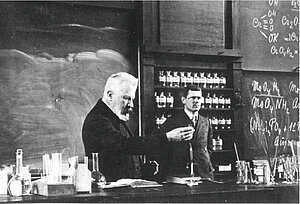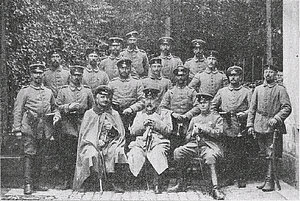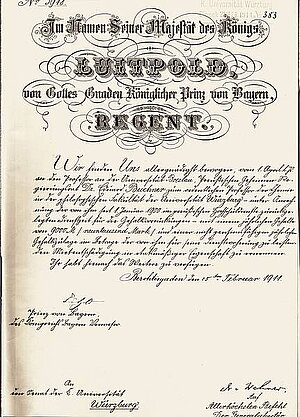Eduard Buchner
Scholar of the month: Eduard Buchner
* 20. May 1860 in Munich † 13. August 1917 in Focșani, Romania
1878 Study of Chemistry in Munich
1888 Conferral of a doctorate
1891 Postdoctoral lecture qualification
1895 Professor in Kiel
1896 Professor in Tübingen
1898 Professor in Berlin (Landwirtschaftliche Hochschule Berlin, 1934 as a faculty of the Humboldt-University)
1900 Postdoctoral lecture qualification in Berlin
1909 Professor in Breslau
1911 Professor in Würzburg
In October 2018 the Universitätsarchiv Würzburg wants to continue to honour the Nobel Laureates of the Alma Julia. In this month the chemist Eduard Buchner will be presented as scholar of the month, who received the Nobel Prize for Chemistry in 1907 for his discovery of the cell-free fermentation.
A bumpy Start
After finishing his military service Eduard Buchner started a promising study of Chemistry at the University of Munich. At the same time he completed an internship with Emil Erlenmeyer, the inventor of the correspondent flask. Because of the tenuous financial situation of his family - resulting from the early death of his father in 1872 - he was forced to quit his studies and work in a canning factory in Munich. This job proved to be financially inadequate on the long run, but belatedly payed out for him, since he was exposed to the process of fermentation for the first time, which would later prove to be the base for his success. In 1884 he continued his studies under Adolf von Baeyer and received his doctorate in Munich in 1888. After Buchner earned his postdoctoral lecture qualification, Baeyer favoured another scientist for the allocation of a newly created associate professorship, which resulted in Buchner feeling disadvantaged, which made him even transfer to Kiel. This incidence caused a constant rivalry between Baeyer and Buchner.
Fermentation without Organisms
The discovery, that yielded Buchner the Nobel Prize in Chemistry in 1907, took place in Tübingen eleven years earlier. There he was for the first time able to extract cell-free press-juice from yeast cells, which caused sugar to ferment and therefor proofed the presumption of a possible cell-free fermentation right. He disproved the common affirmation, that organisms are an essential component in the process of fermentation, but discovered instead, that proteins of the yeast cell cause the fermentation. Even in the years following his discovery Buchner especially engaged himself with fermentation chemistry. Among other things he founded a special department for his research at the “Landwirtschaftliche Hochschule” in Berlin. Because of that, he is known to be the founder of enzymology, a section of biochemistry, which engages with the process of fermentation.
In between War and Research
Despite his continual practice as a professor of the Institute of Chemistry at the Julius-Maximilians-Universität since 1911, Buchner enlisted himself for military service at the beginning of World War I to serve on the battlefield as a major. Upon request of the Alma Julia he was ordered back to his research centre in March 1916, which did not last long. One year later, with the USA’s entry into the war, he enlisted again. Eventually he was harmed so badly in August during battle actions in Romania by a shell splinter that he died somewhat later on August 13th 1917 as a result of his injuries.
Recommended Reading:
Buchner, Eduard/ Buchner, Hans/ Hahn, Martin: Die Zymasegärung: Untersuchungen über den Inhalt der Hefezellen und die biologische Seite des Gärungsproblems, München 1903.





